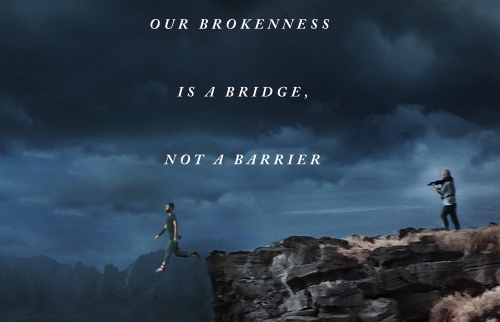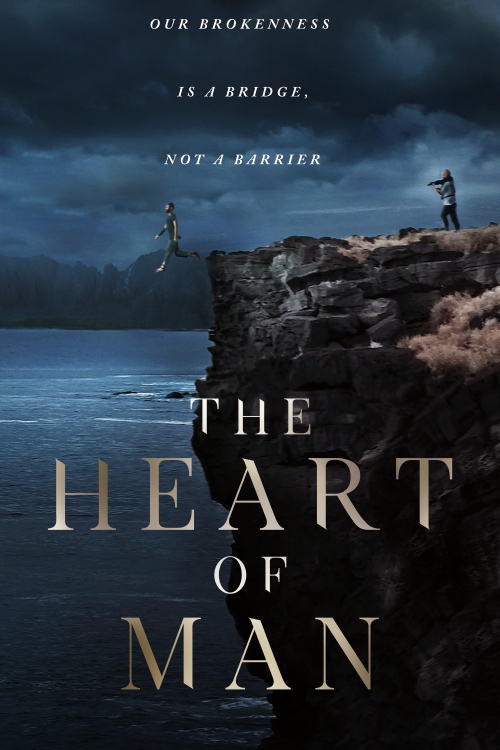
DAVID ADAMS speaks to producer and writer Jason Pamer about how the movie ‘The Heart of Man’ is impacting lives…
“I was sexually abused as a kid. Where was God? Where was He in that room?”
That question, asked during a recent Q&A session following a showing of the US-made docu-drama The Heart of Man in Queensland, is typical of the sort raised by the film says one of its American producers, Jason Pamer.
“We’re not trying to get away from those,” he says but adds that those watching the film won’t find easy answers.
“You and I are humans…and we live lives that we know are not easy. And there’s not a formula. And if there was, we’d all want to tap into that. And religion or institutions that tell you there is a formula to clean yourselves up and get prepared for God, that’s wrong, that’s not accurate. And it’s going to leave us more frustrated in the end when we try to ‘white-knuckle’ it and get through our behaviour through behaviour management only to realise it didn’t succeed which then reaps more shame on us which then helps us go dig in and act out again to get relief. It’s this vicious cycle.”

Released in cinemas in Australia this week, The Heart of Man features several people sharing their own journeys out of sexual broken-ness – including The Shack author William Paul Young and spoken word artist Jackie Hill Perry – as well as key insights from Dr Dan Allender, professor of counseling psychology at The Seattle School of Theology and Psychology and author of books including The Wounded Heart and God Loves Sex.
Interspersed with those speaking to camera about their personal journey is a dramatic retelling of the Biblical Parable of the Prodigal Son, a story found in both the Gospel of Matthew and the Gospel of Luke – which features silent actors – led by Justin Torrence, who plays the aforementioned son – and is acted out against a powerful musical score led by violins.
“We thought, what story, what ancient story would a man and a woman need to be aware of to understand fully – or more fully – what the heart of the Father is? And that ancient prodigal son story…is, I think, one of the greatest illustrative ones….”
– Jason Pamer
Speaking to Sight from Brisbane before flying out to Melbourne last week, Mr Pamer, who is also a co-writer of the film, said the decision to retell the story of the prodigal son came after many hours of conversation between himself, director Eric Esau and Tony Anderson, executive producer and composer – and founder of Unearthed, the company behind the film.
“We said ‘OK, we want to hit the heart and the mind, how do we do that?…” says Mr Pamer.
“And we thought, what story, what ancient story would a man and a woman need to be aware of to understand fully – or more fully – what the heart of the Father is? And that ancient prodigal son story…is, I think, one of the greatest illustrative ones….”
Mr Pamer, who said he’s been “blown away” by the response to the film, had previously worked with director Eric Esau on another film, Rape for Profit, which tackled the issue of sex trafficking in Mr Pamer’s home city of Seattle.
“We were going out, trying to see what was driving this insidious behaviour and we found at the core of it a demand, made up of men, who were all for the most part addicted to pornography. And so we were sort of riding around with vice units and police for about a year capturing that story. And I’m on camera confronting these guys…and I’m reaping a lot of shame on them, feeling very just while I’m doing it…defending these girls.”
It was then that some of his mentors asked him ‘What about those guys?’. And Mr Pamer says that while his initial reaction was that he didn’t care about “those guys”, he was led to see that he in fact he was “that guy”; that his heart also was “oriented in that way”.
So they – together with composer and executive producer Tony Anderson who had also come to a similar revelation having been involved in rescuing women from brothels in various locations around the world – decided to make another film, this time taking a deeper look at what led men to behave so.
“The Rape for Profit film was about the fruit of the tree. This is about root systems.”
Mr Pamer says they made more than 100 versions of the film during editing to get to the one that they eventually released.
“The film literally went from an animated feature film to a feature film to a feature documentary – we went through all these genres [as] we were trying to figure out, ‘OK, what does time allow? What does budget allow? What is the story we want to tell?’…
Mr Pamer says the film, which was initially known as The Hearts of Men and changed a few years ago to the The Heart of Man to better reflect the issues it explores affect all of mankind, is as much for women as it is for men. As well as being an “ontological discussion” about humanity’s general state of being – “who we are created to be deep down” – one of the major themes it explores is sexual abuse.
“Statistically, our sisters will experience sexual abuse at the hands of another higher than the male population will, although we experience it as well. And this is where our version of God gets warped – we start to distrust men, or women, whoever the perpetrators are; we start to question femaleness or maleness and our identifies start to get warped.”
“[Sexual abuse of children] is one of the worst things that humanity had brought upon itself and the film gently looks at the ramifications of that, the way out of that, in a sense, the way to understand…where the Father’s love is in those moments.”
– Jason Pamer
Mr Pamer says that Satan – “the great Evil One” – wants to wreak “as great a havoc on humanity as possible” and so initiates sexual abuse when people are still children to impact them in a way “that will have a compound effect over the arc of their entire life”.
“I think it’s one of the worst things that humanity had brought upon itself and the film gently looks at the ramifications of that, the way out of that, in a sense, the way to understand…where the Father’s love is in those moments.”
He also believes the film has a wider appeal than to Christians alone.
“The film does not have a bunch of religious vernacular and language,” Mr Pamer notes. “The film is, I think, a gentle, tender and kind representation of an ancient cosmic father who wants [to know us] and I think it challenges some religious representations of who God the Father is.”
The film was released in the US in September last year (it’s now also available on Netflix there) and has since been released in South America. After Australia, it is being released in New Zealand and then its off to Europe.
In Australian cinemas it’s showing for just two nights this week – on the 26th and 27th June.
Mr Pamer says the team behind the project are keen to push it “as far and as wide as possible”. To that end, while in Australia, they’ve filmed some roundtable discussions which will air on the Australian Christian Channel. And, via distributors Heritage Films, they’re also partnering with churches to follow up people who may find issues raised in their own lives as they watch the film.
“There needs to be safety nets,” says Mr Pamer. “There is a world in which this film is a grenade thrown into a place and when it explodes, if there’s not protections in place, it could actually hurt lives because of the things it brings to the surface. Heritage (Films) have done a great job on partnering with local churches and ministries to provide conduits for follow-up.”
Resources available for churches and groups, which can be accessed via the website, including a six week study into the major themes of the film.
“And I would just say, you’ve got to find somebody in your life – somebody – that you can trust to share some of your secrets,” adds Mr Pamer. He cites a comment made by William Paul Young in the film – “You’re only as a sick as your secrets”.
“I find it so compelling and true…so we have to expose those things,” says Mr Pamer. “And it can be hurtful and painful.”
Mr Pamer says that journeying to different countries as the film has been released has meant an ongoing engagement with the issues it raises in his own life.
“This is not a film for everybody else,” he says. “This is a film for us, the film-makers. This is an opportunity for us – do we want to live authentically? Do I want to live fully known?
“My producing partner on this, the composer, the director, the lead actor – these are some of my closest brothers in this life and I get to choose everyday, literally for the last four years, do I want to be fully known by them at my worst? And then will they love me the most? And all those guys have answered resoundingly ‘yes’ and because of that I don’t have darkness, I don’t have shadow-sides to myself.”
The Heart of Man is at Australian cinemas for two nights only on 26th and 27th June. For tickets and further information, see www.heartofmanmovie.com.au.





